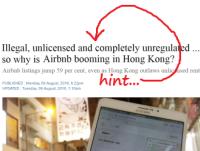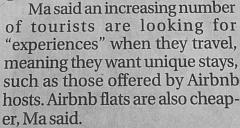The South China Morning Post does an interesting full-page feature on Airbnb in Hong Kong. Like Uber with taxis, Airbnb is the online hippy-sounding ‘sharing economy’ unable to resist the laws of capitalist nature and selling out. Originally a booking system for  backpackers wanting to crash out overnight in people’s homes, it has become dominated by commercial short-term letting and sub-letting of residential accommodation. In tech-economic jargon, it is classified as ‘disruptive’, as it obviously benefits some and hurts the interests of others.
backpackers wanting to crash out overnight in people’s homes, it has become dominated by commercial short-term letting and sub-letting of residential accommodation. In tech-economic jargon, it is classified as ‘disruptive’, as it obviously benefits some and hurts the interests of others.
I’ve used Airbnb in Hong Kong (when relatives were visiting), Japan and the Mainland. The Hong Kong place was a basic sub-divided walk-up in Sheung Wan; the Japanese units were micro-apartments with space-age toilets, portable wi-fi and bicycles; the Mainland apartment was big and in some sort of quasi-resort complex.
They are distinctly cheaper than hotels. While they lack room service and business centres, they have kitchens and domestic stuff like books or even badminton rackets. To add to their attraction for leisure travel, they tend to be in normal residential neighbourhoods, so guests briefly (arguably) get a feel of life in an area with local character and community.
The Airbnb site offers instant access to a huge range of options in many cities, and (once you have an account) booking is quicker and simpler than with a hotel. Check-in is a bit weird: usually no-one meets you, so you have to do a James Bond-thing and locate a key left in a secret place.
What’s the downside?
In many cities, Airbnb is blamed for turning residential neghbourhoods into tourist-infestation zones and contributing to the much-loathed but nebulous gentrification menace. I doubt I ruined the ambience in any Japanese inner-suburbs, but you can imagine the impact in a once-quiet housing district in a place bombarded by zombie-touroids like Barcelona, not to mention the way it is apparently ‘ravaging black neighbourhoods’ in New York City.
Perhaps more seriously, but related, Airbnb is also accused of reducing the supply of long-term housing, thus pushing up living costs for locals. Some cities, like Berlin, are trying to ban it, while others are seeking to formalize it by licensing and – surprise – taxing the hosts. Other jurisdictions encourage letting of spare rooms as a way to increase housing supply and let homeowners make some cash. In Hong Kong, where making life impossibly expensive and unpleasant is government policy, officials are unsure what to do. As with Uber, this is ultimately a transaction between two private parties and difficult to regulate, let alone eliminate.
As my consumer’s experience described above suggests, Airbnb beats the conventional hospitality industry in many or most major respects. The SCMP, loyal to Hong Kong’s feudal ethos that puts landed interests first, expects readers to feel sorry for traditional overpriced hotels. Airbnb is luring their guests away just as this sector – part of our entitled tourism/landlord parasite-cartel – is adding another 10,000 to the city’s 74,000 rooms (yes, even though the Mainland-visitor mass-inundation model has clearly peaked). So the hotel developers aiming to profit from the misery of crowded neighbourhoods’ residents are suffering. Give Airbnb a Gold Bauhinia Medal.




We don’t need the northern dumpling heads to rule us. We will be free.
Let’s see if you still want to give AirBnB a Gold Bauhinia Medal after your neighbours turn their apartments into AirBnB hubs, your corridors suddenly are filled with an ever-changing stream of strangers with unusual habits, for whom you constitute “local character”, and there will be no redress because your local government decides to abdicate its responsibilities on the basis that “this is ultimately a transaction between two private parties and difficult to regulate.” As if governments have never regulated transactions before in human history…